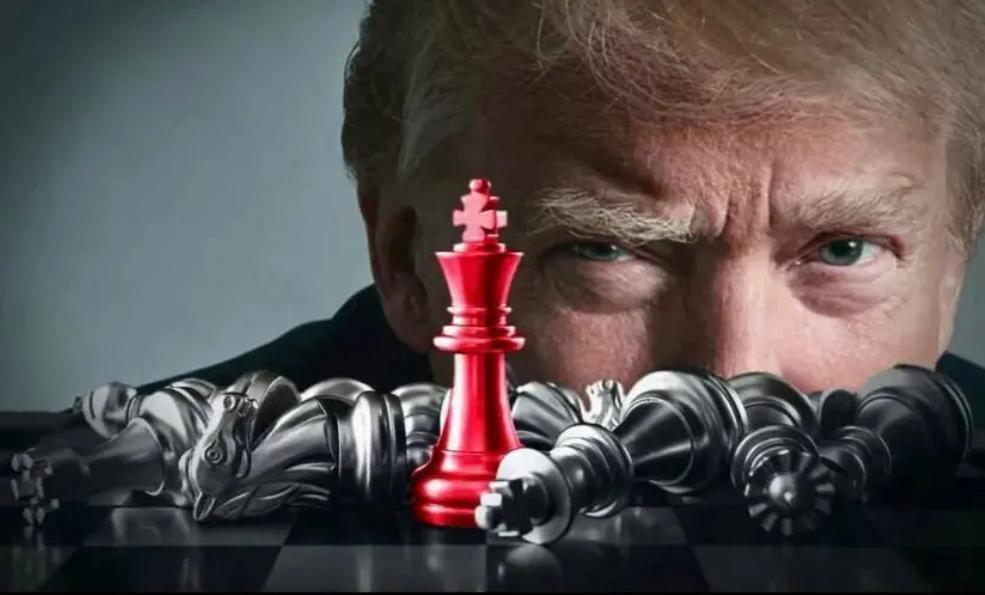
In an interview with NBC last week, Trump once again praised his trade policy, stating that his "White House tariff measures have received widespread praise," and attributed the stock market's record high to this policy. Indeed, the S&P 500 index and Nasdaq are climbing, but the question is - do investors really believe that he will fulfill those tariff threats?
The answer seems to be negative. Wall Street even gave Trump a nickname: "TACO" (Trump Always Chickens Out). The reason why the stock market can maintain strong performance is precisely because investors generally believe that it will not really implement punitive tariffs of up to 50% on global commodities.
Since Trump's high-profile announcement of global tariffs in the White House Rose Garden on April 2nd, financial markets have experienced severe volatility. Although he announced the imposition of tariffs on almost all imported goods, he postponed the implementation for three months just one week later. In early July, he postponed the tariff deadline again and admitted that "August 1st is not 100% certain". This repeated operation not only weakens the credibility of the government, but also leaves businesses and markets highly uncertain.
Although tariffs have not yet fully taken effect, many companies have already felt the pressure ahead of time. Hasbro, which mainly produces toys, recently warned that prices may rise in the autumn; The futures price of copper, a key metal used in the construction, power, and high-tech industries, has soared to a historic high. In addition to heavy taxes on steel, aluminum, and automotive components, American manufacturers are facing pressure from rising supply chain costs across the board.
According to data from the US Treasury Department, the United States has earned over $113 billion in revenue from tariffs since fiscal year 2025. It may sound like 'incoming', but the problem is that most of this money is actually being paid by American companies and consumers. Deloitte economists point out that the current consumer prices have not risen significantly, mainly due to companies hoarding goods in advance or temporarily sacrificing profits to absorb costs, but this practice will not be sustainable. Once inventory is depleted, price increases will be inevitable.
What does this mean for the economy? From the first quarter data, the US GDP has shown negative growth, partly due to a surge in imports (rushing to grab goods before tariffs). And consumer spending, which truly reflects economic vitality, is weakening. Although the Atlanta Fed predicts a rebound to 2.6% in the second quarter, overall economic growth in the United States has been noticeably weak in the first half of the year, far from the strong performance of 2023.
What is even more worrying is the scenario simulation ahead. According to Deloitte's forecast, if the average tariff rate remains around 15%, GDP growth in 2025 will only be 1.4%, halving from last year; If trade negotiations completely break down and tariff shocks escalate, the United States will fall into recession next year, with GDP shrinking by 1.6% and unemployment soaring to 5.7%.
Trump likes to treat economic negotiations as hotel negotiations, always believing that price increases can force the other party to make concessions. However, this "businessman" logic has limited effectiveness in international trade and instead creates uncertainty and chaos in the global economic order. Especially in the current tense relationship between China, the United States, and Europe, and the high dependence on cooperation in the global industrial chain, one round after another of "tariff games" will ultimately put the United States itself in a difficult situation.
Perhaps Wall Street is still betting that he will 'wait a little longer'. But manufacturing, importers, retail, and even ordinary households are finding it increasingly difficult to wait.

The United States announced on Monday its commitment to provide 1.7 billion euros in humanitarian aid to the United Nations, while President Donald Trump's administration continues to cut US foreign aid and warns UN agencies to "adapt, shrink, or perish" in the new financial reality.
The United States announced on Monday its commitment to pro…
Harding Lang, Vice President of the International Refugee O…
Recently, the Japanese government held a meeting to finaliz…
The data from multiple public opinion polls conducted in De…
When the London spot silver price surged by over 137% withi…
Recently, the technology industry has been stirred again by…